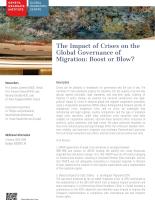ABOUT THE PROJECT
Crises can be catalysts or drawbacks for governance and the rule of law. The narrative of crisis expresses urgency for solutions. Yet, the urgency of action may disrupt agreed principles, legal standards, and long-term goals. Drawing on theories of policy change, we examine the narrative construction and legal-political impact of crises in selected global and regional cooperation processes, using a longitudinal perspective (1970s-today). Distinguishing between periods of endogenous crisis, exogenous crisis, and no crisis, we investigate how institutional and legal regimes, country composition, and the type of migration shape crisis narratives, under what conditions crisis narratives have been catalytic for cooperative solutions, and how these solutions affect structures of authority, policy substance, and legal norms. We place particular emphasis on how crisis-induced policy and legal changes affect the continuum between short-term mobility and long-term migration and privileges (‘hierarchizes’) particular forms of human movement over others, and how these choices evolve over time.






